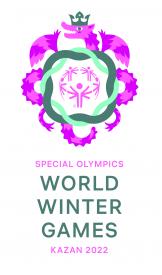Special Olympics International announced that the Special Olympics World Winter Games Kazan, originally scheduled for January 2022, have been postponed to January 2023. This decision is due to current conditions regarding the COVID-19 pandemic around the globe and the priority to for the health and safety of athletes, volunteers, staff and fans.
This is disappointing for Special Olympics across Canada and especially for Special Olympics Team Canada’s athletes, coaches and mission staff who have been so committed and training so hard throughout the pandemic in preparation for these World Games.
Special Olympics International - STATEMENT:
Special Olympics World Winter Games Kazan, originally scheduled for January 2022, have been postponed to January 2023. This decision is due to current conditions regarding the COVID-19 pandemic, including spread of the Delta variant, and was reached in close collaboration with Special Olympics, the Kazan Local Organizing Committee, and Russian Federation officials in consultation with the Centers for Disease Control and Prevention, the World Health Organization, and other public health experts.
People with intellectual disabilities are at higher risk for serious illness and death from COVID19. Some Special Olympics delegations are hesitant to travel internationally, and many are simply unable to travel because they lack access to the vaccine or don’t have the necessary resources to adequately quarantine athletes returning from other countries. In light of these factors, postponing the Winter Games is the prudent decision to help protect the health and safety of athletes, volunteers, staff, and fans.
Special Olympics World Games are more than sports. They are a tentpole in the inclusion revolution. Postponing World Winter Games Kazan to January 2023 helps ensure broad participation from delegations, high quality competitions, and the cultural programming essential to the legacy of every Games.
FAQs
1. Why were World Winter Games Kazan postponed to 2023? What if the pandemic isn’t resolved by then?
- Special Olympics World Winter Games Kazan 2023 have been postponed to January 2023 out of an abundance of caution for the health and safety of athletes, volunteers, staff, and fans.
- This decision was made in close collaboration with Special Olympics, the Kazan Local Organizing Committee, and Russian Federation officials, and in consultation with the Centers for Disease Control and Prevention, the World Health Organization, and other subject matter experts.
- Special Olympics Programs were consulted to ground truth the feasibility of participation, and athlete leaders shared their insights on the risks and benefits of holding an international event in five months.
- Due to the Delta variant of COVID-19 spreading across the globe, some Special Olympics Programs are hesitant to travel internationally. Many delegations are unable to travel outside their home countries because they don’t have access to the vaccine or don’t have the resources needed for quarantines.
- If the Games were to proceed as planned in January 2022, we risk having fewer athletes participate, which would lower the quality of sports competitions and jeopardize cultural activities and other planned programming. A smaller World Winter Games could prevent media coverage of the event, suppressing the ultimate goal of the Games – to inspire inclusion in Russia and around the world.
- We will continue to monitor the state of the pandemic and explore scenarios to safely hold in-person events that provide people with intellectual disabilities opportunities to get fit, make friends, and experience joy. Currently, Special Olympics requires everyone participating in international events—including World Winter Games—to be vaccinated.
2. What does this mean for my delegation?
- The quota as of 1 July 2021 will remain the same for 2023. Programs will be asked to re-confirm quota in early 2022, and Regions will have flexibility to reallocate quota as appropriate.
- Your Program can send delegations to both the postponed World Winter Games Kazan and the World Games Berlin in 2023.
3. What do I tell athletes/staff/partners/media? When do I tell them? How do I share this information?
- Program leaders should alert staff, athletes, and partners as soon as possible, and in that order. Timing is important: there should be no more than two hours between when you alert staff and when you alert partners. SOI Communications is approaching a select few media outlets to cover this news, and it is important for our stakeholders to learn this from Special Olympics first, not the media.
- If questions arise for which you do not have answers, do not make up an answer—contact your Regional President for further guidance.
- At this time, do not proactively share this information with media. If you are approached by a member of the press to comment on the postponement of World Winter Games, provide the reactive holding statement in writing via email as written below. If you are pressed for further information, contact SOI Communications or your Regional Communications Lead.
- Delegations that have begun fundraising should assess the status of their campaigns and whether announcing this postponement could provide an opportunity for a funding appeal, or if an announcement followed by a ‘quiet period’ would elicit a more positive response.
4. Where do I go with specific questions?
- Please contact Blair McIntosh VP Sport; bmcintosh@specialolympics.ca
- For media request, please contact Karen Cinq Mars VP Marketing and Communications; kcinqmars@specialolympics.ca

